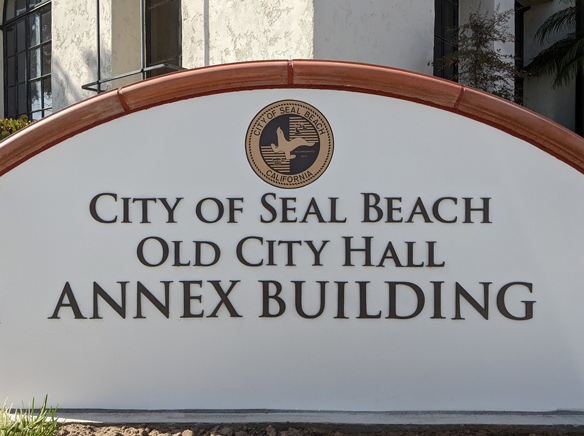Second in a series on the Seal Beach’s strategic planning.
This particular conversation began with a discussion of the Seal Beach’s challenges.
Unfunded mandates from the state appear to be among the greater challenges facing cities in general.
The occasion for this discussion was the day-long Strategic Planning Workshop on April 4. (Part one of this series looked at the city’s revenues and expenses. For details, see “Expenditures expected to outpace revenue,” at sunnews.org.)
Community Development Director Alexa Smittle cited some of the state’s mandates: planning for sea level rise; 100% automated permitting, particularly for solar, required by law by September 2024.
Another mandate: housing inspection services. Smittle said she didn’t know this was coming. She the city had to provide that service.
“We don’t have staff that’s qualified to do some of these inspections,” Smittle said.
“In fact, neither does the county,” she said. “Fascinating stuff.” The council members and everyone else laughed.
Another mandate: training and safety programs for code enforcement officers. Smittle said that was legislation from last year. “We’re working on it, but we’re not there yet,” Smittle said.
“Every year there’s a new amount of stuff,” Smittle said.
“The legislation says that this is not an unfunded mandate because you can charge fees,” Smittle said.
Assistant City Manager Patrick Gallegos said that something that is “new-ish” is that the state is trying to get back grant money. “So that’s something to think about as we contend with all these unfunded mandates [is] that there’s gonna be some clawback in the state,” Gallegos said.
Seal Beach Police Chief Michael Henderson gave the council the police perspective. Henderson said that police reform is a topic on the state level. He said he expects that to continue. As a result, new legislation has been enacted requiring more training. “We want the highest trained police officers we can find,” Henderson said.
“But that is often is not accompanied by a funding component to them,” Henderson said.
“So the state imposes a training requirement for police officers for, say, crowd control training. I no longer have the discretion to say, ‘we’ll do it at this time under the circumstances,’” Henderson said.
Chief Henderson said if the state is imposing a mandate of hours for training, he’s now taking away from something else to pay for that.
Henderson said training was valuable. “I’m not saying it’s not something you shouldn’t do,” he said.
But according to Henderson, there is rarely funding that comes along with the requirement.
“In the Police Department, we’re primarily personnel driven, so that means I’m taking personnel and manpower away from something else to give to whatever that mandate is,” Henderson said.
Public Works Director Iris Lee said there was no shortage of unfunded mandates for her department either. She started by citing the electrical vehicle mandate. “California is going towards zero emission vehicles,” Lee said.
She said this was something the city needs to implement.
Potable water was another issue.
“So how are we going to be reporting, testing and making sure that we have a good potable water for our constituents to consume? Reporting for sewer: The water board is and state board has been increasingly compounding auditing requirements,” Lee said.
“Not to mention that there are a number of Master Plan documents that we have that we need to chip away at,” Lee said.
Later on during the meeting, District Five Councilman Nathan Steele asked if the city knew how much money was spent on unfunded mandates.
The city did not have an answer.
Steele made it clear he wasn’t criticizing staff. “I think that would be helpful when we go talk to our constituents,” Steele said.
District One Councilman Joe Kalmick said they know the city has unfunded mandates. Steele said it would be helpful to be able to tell constituents the city was spending “this much” to be in compliance with mandates.
A few minutes later, City Manager Jill Ingram explained that the city hires consultants because sometimes the expertise is required, either by a state mandate, or by the city council. She said staff doesn’t necessarily have that expertise. She said that an article in the paper will say that the city has approved a professional services agreement with a consultant. “That is the headline instead of the reason why that’s a good thing for our city,” Ingram said.
Assistant City Manager Patrick Gallegos brought up the California Public Records Act. According to Gallegos, the city has a high volume of public records requests. He said the amount of time spent on public records requests was enormous. Gallegos said the city often has to get an extension because staff is doing day-to-day work.
City Clerk Gloria Harper said the city had 345 Public Record Act requests in 2022.
Community Development Director Smittle said the public has a right to request records and the city has 10 days to respond.
Harper said sometimes the public believes the city has 10 days to produce the records.
According to Harper, requests require going through documents and consulting the city attorney. “It’s a lot of moving parts just with one request,” Harper said.
Rick Haydon of Baker Tilly, the consulting firm that planned and led the meeting, said that at one time cities kept track of mandates.
“For your benefit There was a day back in the ’80s and early ’90s, in which city staff used to keep track of how much time they spent on mandates, because they were state mandates,” Haydon said.
“But back in the early ’90s, the state legislators snuck in an eight-letter word in there called ‘unfunded’ and once they shot that across the bow, they said let’s make this a law, let’s make it unfunded, and it got through,” Haydon said.
“Then they started saying, ‘from now on we’re gonna make these unfunded,’ because what they were doing was they were hurting from a recession,” Haydon said.
“And they were looking at ways of ‘how can we not have to pay these cities [for] keeping track of all this time that we require them to do these duties,” Haydon said.
“So at one time, cities did keep track of a lot of those mandates because they got reimbursed for them,” Haydon said. He said they were called SB90 state reimbursements.
“But that went away probably 20 years ago,” Haydon said.
He said mandates are now all unfunded.












